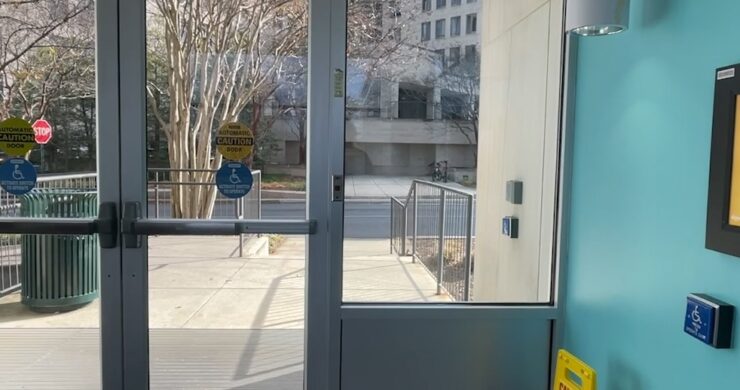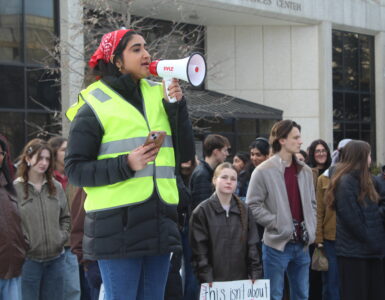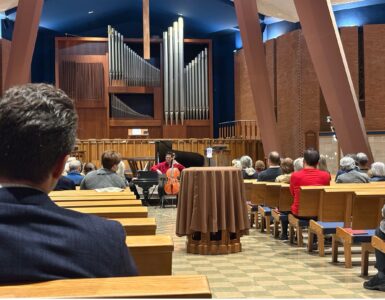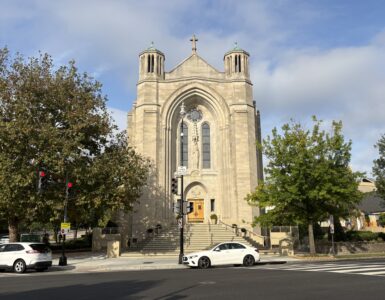Katherine Greenstein knew from a young age that they were disabled but didn’t know about disability community efforts until after they graduated high school in 2020. Coming to American University that fall, Greenstein saw a world of opportunity to create a space of unity for disabled undergraduate students on their campus.
Greenstein, in the last four years while completing their Bachelor’s in the School of Public Affairs, became the first person to graduate with a minor in disability studies. They also created the Disabled Students Unions, one for the undergraduates and one for the graduate students. This is where Greenstein’s and many others’ fight for equal accessibility on AU’s campus began but is not nearly close to being completed.
“We get a lot more credit than I think we deserve,” Greenstein said about American University’s accessibility. “People will come to the university thinking that we’re in, like, the top 10 most accessible universities. We still have two ADA-non-compliant buildings… East Quad Building and Hurst Hall are both non-accessible buildings. I cannot get into them. I cannot use them. I cannot have classes in them.”
And this is just one of the many accessibility issues Greenstein mentioned on campus. They also mentioned potholes, elevators not working, steep ramps, door actuator buttons never being fixed, which are among a slew of other physically restricting roadblocks for the disabled community members on campus.
Issues like these are a large part of the reason why many in the community believe that the administration needs to act and listen to their students.
However, after The Wash conducted its own investigation and revealed that the university currently does not have a 504 Coordinator for its students, the administration seems much farther away from addressing accessibility issues than many initially thought.
According to the U.S. Department of Education, “All school districts, colleges, and universities receiving federal financial assistance and employing 15 or more persons must designate at least one employee to coordinate their efforts to comply with and carry out their responsibilities under Section 504.”
Currently, American University falls under both categories, thus legally needing to require a 504 Coordinator that should have their contact information published. The Wash looked into this further, finding that the only documentation of a 504 Coordinator for students is under the University’s Reasonable Accommodations Grievance Procedures for Students that cites Seth Mancini, Office of the Deputy Provost and Dean of Faculty, as the coordinator.
This policy, last revised in 2023, needs to be corrected. If any member of the community were to type Mancini’s email into their Outlook search, an automated message would automatically show.
“Thank you for your message,” the automated message said. “Please note that as of Thursday, September 5, 2024, I am no longer employed at AU.”

In response to an interview request from The Wash, Associate Director of Disability Support in the Academic Support and Access Center (ASAC), Nicole Nowinski would only respond via email. In one of Nowinski’s answers, she addressed Section 504.
“We recognize that the overarching laws, such as the ADA and Section 504, that regulate our work are not perfect and there is still progress to be achieved regarding equal access across many public and private sectors,” she said. “However, the ASAC is committed to ensuring the AU student body is aware of the disability-related services the ASAC provides.”
The Wash has since reached out again to ASAC and the Provost Office for a reply on speculation of there currently being no 504 coordinator for students, and are now awaiting response.
As more community members realize that the University’s policy is false and not updated, student leaders have begun to act.
Kasey Bernat, a sophomore and student senator in the Undergraduate Student Government at American University, wrote the Disabled Students Bill of Rights this October with the help of many disabled students on campus.
The bill, according to Bernat, was meant to demand the institution to recognize not only the movement, but also create better accommodations through several channels, like ASAC, for students. The response from the administration? According to Bernat, nothing.
“There is in the introduction, it asks that the administration send out an email, at least acknowledging it and saying that they would work with the USG, so it’s really upsetting that they didn’t reach out,” he said.
“We get a lot more credit than I think we deserve,” Greenstein said about American University’s accessibility. “People will come to the university thinking that we’re in, like, the top 10 most accessible universities. We still have two ADA-non-compliant buildings… East Quad Building and Hurst Hall are both non-accessible buildings. I cannot get into them. I cannot use them. I cannot have classes in them.”
Bernat and others also know that the 504 Coordinator for Students has not been appointed and said that the next steps could potentially involve legal action.
“There’s talks about pursuing action legally with the 504 coordinator, and the fact that we may or may not have one for students, and that is a huge issue, and that’s something that needs to be addressed, and that’s one of the things I’m going to keep advocating for, talking to students who do know and talk to admin about this type of stuff,” Bernat said.
Dr. Tanja Aho, Senior Professorial Lecturer of American Studies at American University, believes that people in the community are afraid to address these accessibility issues due to their own lack of knowledge.
“I think a lot of people are afraid of disability because they’ve never been taught how to think about it, and because even when they themselves are oftentimes disabled or neurodivergent or chronically ill, right?” Dr. Aho said.
Despite the reasoning, members of the disabled community on campus, like Greenstein, are asking the administration to listen.
“So, when we’re asking for help, we need you to listen, and that’s one of the things that I think is most important,” Greenstein said. “We need to be listened to, and we need to be seen as a community who deserves the same things as all of the other communities on this campus, and I think that that’s one of the things that we’re just not being listened to on.”
The Wash will closely monitor the students’ next steps, the administration’s response and the outcome of the 504 Coordinator for Students.















Add comment